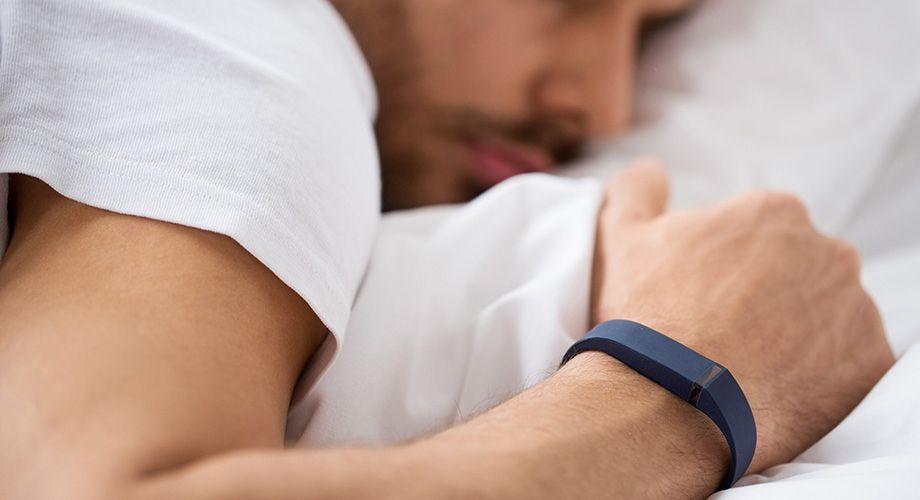
Large-scale study of anonymized data from Fitbit users finds adults with obesity sleep less, with more variability
Wearable devices give scientists a powerful new tool for sleep studies.
September 14, 2020
LA JOLLA, CA — Obese adults sleep an average of 15 minutes less per night than those who are not obese, according to a new study of anonymized data from more than 100,000 Fitbit users conducted by scientists at the Scripps Research Translational Institute and UC San Diego.
The landmark sleep study adds to a growing base of scientific evidence on the relationship between sleep and obesity. And although the retrospective study could not establish causal connections, its results are consistent with other findings that suggest insufficient sleep and obesity make up a vicious cycle: inadequate sleep promotes obesity, while obesity tends to worsen sleep quality.
The scientists, whose findings appear September 14 in JAMA Internal Medicine, examined de-identified data from 120,522 Fitbit users, covering a median of 256 nights per user. They found that people with a body-mass index (BMI) of 30 or more—the clinical definition of obesity—slept 6.62 hours per night on average, about 15 minutes less than the average 6.87 hours per night for those with a BMI under 30.
The study also hints that consistent sleeping patterns might be as important as sleeping longer. The high-BMI Fitbit users tended to not only sleep less than the lower-BMI group, but also had slightly more night-to-night variation in their sleep.
“We observed in this dataset that some people consistently got the same amount of sleep night-to-night while others had far more variable sleep,” says study co-lead author Stuti Jaiswal, MD, PhD, assistant professor of molecular medicine at Scripps Research. “This variability may be important for overall health.”
Obesity is a modern epidemic implicated in a host of other diseases. More than 40 percent of adult Americans are now considered obese, compared with about 30 percent two decades ago and about 10 percent in 1960. The complex condition promotes type 2 diabetes, cardiovascular disease, hypertension, stroke and certain cancers, among other health conditions. Thus, preventing obesity could have tremendous public health benefits—and getting people to sleep better is one potential strategy for doing that.
For the new study, sleep duration and variability were measured using de-identified data from Fitbit devices that track movement, heart rate and other health-related factors. Some of the devices also have a sleep-tracking function that uses movement and pulse data to derive estimates of the time spent in different sleep stages.
Fitbit devices and other wearable technologies have opened the door to large-scale scientific studies that were challenging or impossible using traditional clinical means.
“We were able to analyze sleep patterns for individuals in their natural, everyday situations for almost two years per user, in some cases,” says the study’s co-lead author Giorgio Quer, PhD, senior staff scientist and director of artificial intelligence at Scripps Research Translational Institute. “By contrast, sleep studies in a clinic have to be much shorter and don’t represent the participant’s everyday reality. Surveys of sleep habits also tend to be problematic, as they are subjective and thus, more prone to error.”
For this study, the scientists collaborated with Robert Owens, MD, a sleep physician who was able to put the data in context of prior research.
“The relationship between weight and sleep, particularly sleep variability, has been shown in small studies,” says Owens, associate professor of medicine at UC San Diego School of Medicine. “To be able to find the same signal on a much larger scale, in hundreds of thousands of people, using Fitbit devices, shows the potential for wearables and consumer devices to advance science and public health.”
The scientists plan to do further health-related studies using wearable-device data.
Researchers from the Scripps Research Translational Institute have published two prior studies based on Fitbit data—one examining resting heart rates, and another examining the potential of Fitbit data to provide early warnings of flu outbreaks. They are also currently conducting a clinical study, DETECT, that uses wearable health data to help track outbreaks of COVID-19 and other viral respiratory diseases.
“Association of sleep duration and variability with body mass index: Sleep measurements in the US from a large population of wearable users” was written by co-lead authors Stuti Jaiswal and Giorgio Quer, and by Michael Galarnyk, Steven Steinhubl, Eric Topol, all of the Scripps Research Translational Institute; and Robert Owens, of UC San Diego School of Medicine.
Funding was provided by the National Center for Advancing Translational Sciences (UL1 TR002550). Fitbit did not have any role in study design, execution or funding.
For more information, contact press@scripps.edu

